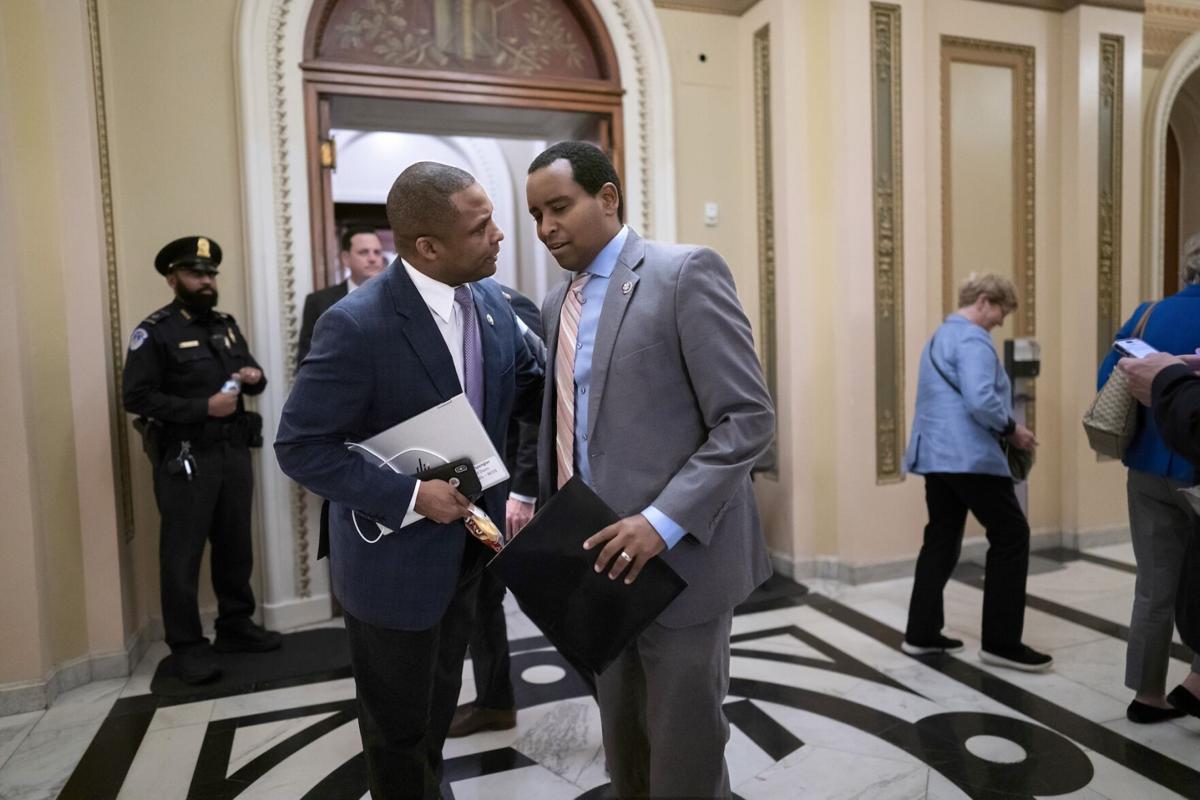Joe Neguse, Yadira Caraveo lead Colorado’s House delegation on bipartisan ranking | TRAIL MIX
U.S. Reps. Joe Neguse and Yadira Caraveo, both Democrats, ranked as the most bipartisan members of Colorado’s House delegation last year in an annual index released jointly by the nonpartisan Lugar Center and Georgetown University’s McCourt School of Public Policy.
The same study placed their Republican colleague U.S. Rep. Lauren Boebert near the bottom of the ranking, alongside the chamber’s least bipartisan lawmakers.
On the Senate side, the state’s two envoys to Washington, U.S. Sens. Michael Bennet and John Hickenlooper, both performed in a bipartisan fashion last year, according to a formula the political scientists have used since 2014 to calculate how readily Capitol denizens reach across party lines on legislation.
In all, both senators and four members of Colorado’s House delegation, all Democrats, landed in bipartisan territory on the index. In addition to Neguse, and Caraveo, U.S. Reps. Jason Crow and Brittany Pettersen also finished above a threshold built into the study that determines whether lawmakers had bipartisanship in mind, compared to historic data from previous congresses.
While Boebert was alone among Coloradans in the nether-reaches of the list, her two Republicans colleagues, U.S. Reps. Ken Buck and Doug Lamborn, along with Democratic U.S. Rep. Diana DeGette, also fell below the line into the partisan zone.
The study’s authors said this year’s report shows an “intensely partisan Congress” but noted that the scores demonstrate a slight improvement from the previous few years.
Maria Cancian, the McCourt school’s dean, said in a statement that the metric is increasingly useful the more partisan national politics become.
“In these deeply divided times, and with an increasing amount of misleading information online, we need tools like the Bipartisan Index more than ever — an evidence-based and nonpartisan approach for measuring how well policymakers work across the aisle to get things done,” Cancian said. “And while there is much room for improvement, I am encouraged to see some progress on cross-party collaboration.”
The study measures how often lawmakers sign on as co-sponsors to bills introduced by members of the other party, as well as how often bills introduced by lawmakers attract co-sponsors from across the aisle. Its authors say they omit non-binding resolutions, private bills and ceremonial legislation, including naming post offices, but otherwise don’t exert any influence on the results, letting the numbers speak for themselves.
A complicated series of calculations ensues that involves weighting the figures to reflect a variety of factors, including whether the members are in the majority or minority, since the opportunity to win friends and influence fellow lawmakers can vary. The statisticians then compare results to 20 years’ worth of data to yield each lawmaker’s composite score, with scores in positive territory reflecting bipartisan behavior, and scores below zero indicating the alternative.
For the fifth year running, Pennsylvania Republican Bryan Fitzpatrick topped the House list, while Maine Republican Susan Collins held her customary spot atop the Senate ranking.
Among the Colorado lawmakers, Neguse, in the first year of his third term, ranked 18th out of 436 House members subject to the analysis — reflecting some turnover in the chamber during the year — with a score of 1.35145, putting him in roughly the top 4% on the bipartisan scale.
“The past year has presented many challenges for our communities,” Neguse said in a statement after the rankings were released.
“Through it all, our team has worked to do what we’ve always done and cut through the chaos, work with folks of all political stripes, and commit to delivering results for the people of Colorado,” he said. “I believe that we are at an inflection point as a country. A time at which it is of the utmost importance that we work together to foster greater collaboration and dialogue with those who we may disagree.”
Notably, Neguse, the assistant Democratic leader — No. 5 in the chamber’s Democratic hierarchy — scored significantly higher on the list than any of his fellow members of House leadership from either party, though in 2023 he was officially on the margins of that rarified group in the party’s No. 6 position, before ascending a step to replace the previous assistant leader, who stepped aside.
Caraveo, a freshman lawmaker, finished 28th on the list in her first year in office, with a score of 0.98084.
Caraveo told Colorado Politics in a statement that it was an honor to be ranked so high on the bipartisan index.
“The people of the Front Range and Northern Colorado sent me to Congress to work across the aisle and get things done, and that’s exactly what I’ve done since I took the oath of office,” she said. “I’m grateful to the Lugar Center for recognizing the efforts I’ve made to work with both parties and deliver for working Coloradans.”
A bit further down the scale but still well within the bipartisan range, Crow, also in his third term, ranked 42nd with a score of 0.78442, while Pettersen, Caraveo’s fellow first-year lawmaker, finished in 57th place with a 0.48820 score.
Dipping into negative territory — indicating less bipartisan behavior than the historic average — Buck, a five-term lawmaker who resigned his seat in March, ranked 146th with a -0.08514 score. Lamborn, in his ninth and final term, came in 169th at a -0.21024 score, with the 14-term DeGette further back in 298th place, scoring -0.84837.
Boebert landed just eight spots above the last-place finisher, Ohio Republican Jim Jordan, in 428th place, with a -1.98667 score, one spot below Minnesota Democrat Ilhan Omar. Her spokesman declined to comment on the ranking.
Crow cracked the top 10 in the center’s previous ranking, which measured bipartisanship for the 117th Congress, in session from 2021-2022, where he finished in eighth place — a spot above Nebraska Republican Don Bacon, who is routinely hailed as a model of cross-the-aisle collaboration.
In the same ranking covering the 117th Congress, Boebert landed at the very bottom of the list, in last place, a spot below Georgia Rep. Marjorie Taylor Greene.
Over in the Senate on this year’s index, Hickenlooper’s score of 0.41157 put him in 27th place out of 98 senators — both chambers’ top leaders are excluded from the index, since they handle bill sponsorship differently than the rank-and-file — followed closely by Bennet, who came in 32nd, with a score of 0.24740.
Alabama Republican Katie Britt was the least bipartisan senator in 2023, according to the index.
The Republican Hickenlooper replaced, Cory Gardner, routinely finished near the top of the bipartisan list, including coming in fourth overall in the last Congress he served in, from 2019-2020, and finishing in fifth place for the two-year period before that.
The bipartisan ranking has its critics, including some who argue its formula obscures rigidly partisan behavior that runs contrary to the study’s objectives, and others who insist there are other, better ways to assess bipartisan cooperation. But its authors say it measures something important.
“Members of Congress can increase their score either by actively seeking out agreeable ideas proposed by the opposite party or by drafting legislation that is likely to attract members of the other party,” the study’s organizers say, describing the methodology they use. “The Index rewards those who prioritize governance over posturing and aims to encourage members of Congress to seek areas of consensus as opposed to simply using legislation to delineate differences.”
When the bipartisan ranking was first introduced in 2014, the late former Sen. Richard Lugar, an Indiana Republican who was unseated after six terms in a primary amid criticism he worked too well with Democrats, explained the reasoning behind the index produced by the center he founded after he left office.
“What we are measuring in this Index is not so much the quality of legislation but rather the efforts of legislators to broaden the appeal of their sponsored legislation, to entertain a wider range of ideas, and to prioritize governance over posturing,” Lugar said.
Ernest Luning has covered politics for Colorado Politics and its predecessor publication, The Colorado Statesman, since 2009. He’s analyzed the exploits, foibles and history of state campaigns and politicians since 2018 in the weekly Trail Mix column.











